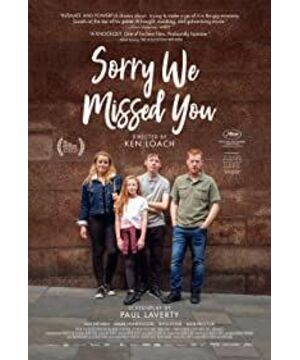This film about the subprime mortgage crisis, from Ken Loach's hands, feels like another "British society pill". In 1969, at the age of 30, Ken Loach made "The Kid and the Eagle", a documentary film about the working class, which was later hailed as "one of the greatest works of British history". Qi is a late bloomer in international film festivals, winning his first Palme d'Or at the age of 69. In 2014, 78-year-old Ken Lodge announced that he would no longer be shooting new films.
Then the "Sorry, We Missed You" released in 2019 can be described as "Guan Shan's work among Guan Shan's works".
Whether it's the film shots, the frame of the picture or the plot unfolding, it all reflects the skillful skills of a "film veteran". In addition, the focus of the film is the image of the working class who is good at portraying the working class who are struggling in difficult situations: "Life at the Bottom" (1991) homeless construction workers, illegal immigrant cleaners in Bread and Roses (2000), disenfranchised railroad workers in Railroad Song (2001), and In "Free World" (2007), the employees were maliciously fired by intermediary companies.
The background of the film is also very simple: the protagonist with a son and a daughter lost his house and job in the subprime mortgage crisis, so he decided to become a courier boy. However, unlike the domestic couriers, the British couriers also need to buy a "luxury" truck for delivery, and there is no foreign station for storage, and no APP for scheduling, so they have to use a company. An expensive and deadly machine developed by yourself (similar to the domestic Big Dipper? It can navigate, allow customers to track goods, send and receive information, etc., and the price is 1,000 pounds). In addition, the novice protagonist also encountered many twists and turns in the process of delivery:
For example, when the elevator does not work, I still encounter uncooperative customers; because the team I support is inconsistent with the customer, I have a dispute with the customer; His temper is really irritable, and I have been sweating for him after many conflicts, but the customer has never complained about him. In the end, he was complained because he took his daughter to deliver the courier (I didn't expect the reason for the complaint, could it be? Because of the note below?)
Another conflict also comes from the family: the son skips class, or even gets suspended for fighting; the wife has to sell her car, pay the down payment for the truck for her husband, and can only travel between different difficult clients by bus; the education of children different attitudes; because of the busy work, the family spends less and less time together...
After watching the movie, the story is very smooth and the plot is relaxed and relaxed. It is a textbook-level movie. What is particularly interesting is that the movie is shot in the middle, showing the plot of a family's warm time: the father and the little daughter ran the express delivery for a day , The daughter was lively and cute, so she took a lot of tips. The father decided to use the tip to "luxury" to order an Indian food takeaway for the whole family to eat together. Even the rebellious son showed a rare smile. Halfway through the meal, the wife received a call to work overtime to take care of the old man, and the son suggested that the whole family could drive a truck, so they sang and listened to music, and the whole family enjoyed themselves.
Seeing this, I pressed the pause button, and I thought, there must be a turning point later. Sure enough, at this time, the movie is just in the middle of the progress bar.
The conflict in the second half is more cliché, the climax of the film is in the last 15 minutes: the protagonist's truck of goods is robbed by the gangster, and he is also beaten with a bruised nose, but the evil capitalist not only does not take care of himself, but also asks him Thousands of pounds in compensation, and additional deductions for leave. In the end, the protagonist was forced to do nothing. He limped with a swollen face and continued to deliver the courier despite the opposition of his family.
The film ends here, and after watching it, I can't help feeling sympathy, cursing the capitalists and feeling a little heavy at the same time. But I feel that the contradiction here is too simple and rude: No wonder the boss allows him to ask for leave and does not want him to compensate, can all the problems be solved? No wonder the main character is confined to such a situation, is it all the cauldron of the capitalists?
Perhaps, we can go a step further: what kind of life do capitalists live? Is it a song every night, a tender model of the club? Obviously not. The workers have to go to the warehouse to pick up the goods on time at 7:00 every morning for delivery, and the boss has never been late. Does the boss have no loan for renting such a warehouse? The boss doesn't have a family, doesn't he grow old, get sick and die?
Contradictory opposition, if you can find a clear goal, it will be very simple indeed. But to make capitalists too smeared is to think too simplistically about this society. Perhaps, we should ask ourselves a question: after solving the capitalists, will the life of the working class really get better? Or is it the essence of human civilization that everyone must endure pain?
I was expecting Kenlodge to give me an answer, but I was disappointed that I didn't find it.
View more about Sorry We Missed You reviews











